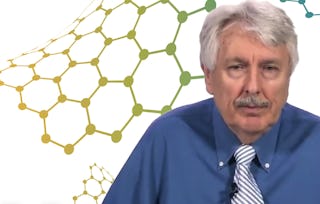Have you ever wondered why ceramics are hard and brittle while metals tend to be ductile? Why some materials conduct heat or electricity while others are insulators? Why adding just a small amount of carbon to iron results in an alloy that is so much stronger than the base metal? In this course, you will learn how a material’s properties are determined by the microstructure of the material, which is in turn determined by composition and the processing that the material has undergone.

Material Processing

1,075 reviews
Skills you'll gain
Details to know

Add to your LinkedIn profile
7 assignments
See how employees at top companies are mastering in-demand skills

There are 2 modules in this course
This course picks up with an overview of basic thermodynamics and kinetics as they pertain to the processing of crystalline materials. The first module deals with phase diagrams - charts that tell us how a material will behave given a certain set of variables such as temperature, pressure, and composition. You will learn how to interpret common and complex phase diagrams and how to extract useful information from them.
What's included
25 videos5 readings4 assignments
If thermodynamics, which we covered in the previous module, tells us how a material wants to change, then kinetics tells us how and how quickly that transformation occurs. This module starts by explaining the driving force for phase transformations. We will cover the nucleation and growth of precipitates, solidification, and sintering. Finally, there are a number of lessons which apply all that has been covered in the course to understanding carbon steels.
What's included
33 videos3 readings3 assignments
Instructor

Offered by
Explore more from Mechanical Engineering
 Status: Preview
Status: PreviewGeorgia Institute of Technology
 Status: Free Trial
Status: Free TrialArizona State University
 Status: Free Trial
Status: Free TrialArizona State University
 Status: Free Trial
Status: Free Trial
Why people choose Coursera for their career

Felipe M.

Jennifer J.

Larry W.

Chaitanya A.
Learner reviews
- 5 stars
80.01%
- 4 stars
16.91%
- 3 stars
2.13%
- 2 stars
0.65%
- 1 star
0.27%
Showing 3 of 1075
Reviewed on Apr 11, 2020
I Great thank to Professor Thomas H. Sanders, Jr. for providing valuable information . I joyed a lot on Material Processing course and i learnt new information.
Reviewed on Apr 13, 2020
However the course is good to understand the processes of the concepts of materials and the importance gathering the equations and other suggestions are good.Thanks&Regards
Reviewed on Aug 29, 2020
Complete knowledge on eutectic system and different curves b/w temperature and the composition ,single and two component systems etc.

Open new doors with Coursera Plus
Unlimited access to 10,000+ world-class courses, hands-on projects, and job-ready certificate programs - all included in your subscription
Advance your career with an online degree
Earn a degree from world-class universities - 100% online
Join over 3,400 global companies that choose Coursera for Business
Upskill your employees to excel in the digital economy
Frequently asked questions
To access the course materials, assignments and to earn a Certificate, you will need to purchase the Certificate experience when you enroll in a course. You can try a Free Trial instead, or apply for Financial Aid. The course may offer 'Full Course, No Certificate' instead. This option lets you see all course materials, submit required assessments, and get a final grade. This also means that you will not be able to purchase a Certificate experience.
When you purchase a Certificate you get access to all course materials, including graded assignments. Upon completing the course, your electronic Certificate will be added to your Accomplishments page - from there, you can print your Certificate or add it to your LinkedIn profile.
Yes. In select learning programs, you can apply for financial aid or a scholarship if you can’t afford the enrollment fee. If fin aid or scholarship is available for your learning program selection, you’ll find a link to apply on the description page.
More questions
Financial aid available,

